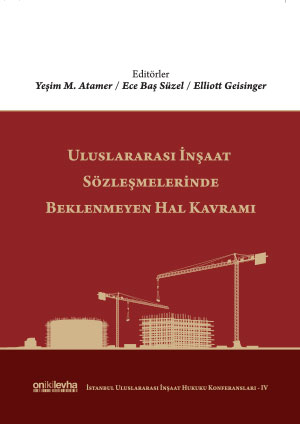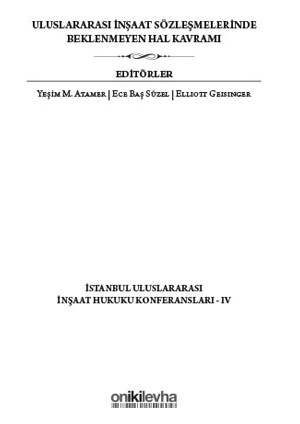The Unforeseen in International Construction Contracts
Foreword
İstanbul Bilgi University Faculty of Law and Schellenberg Wittmer Ltd. co-organized the fourth of the Istanbul International Construction Law Conferences on 15 November 2019. This year’s topic was The Unforeseen in International Construction Contracts.
A popular saying in the construction industry is that the only thing that is foreseeable in international construction projects is that something unforeseen will happen. In today’s world of ever-tighter construction programs, increasing complexity of projects, and in which political and/or economic instability – and even pandemics, as the new developments painfully show – are additional uninvited guests, this saying has never been more apposite. This year’s conference aimed to shed light on how the unforeseen is dealt with in modern international construction projects, starting from the contract drafting phase and ending with dispute-resolution, and as in previous years, involving contributions of speakers representing a variety of backgrounds: contractors, specialized lawyers and the academia.
This book is the fourth in our Series on international construction contracts and includes the partly expanded versions of the papers presented at the conference. In the first introductory chapter, Ümit Yamantürk (Güriş Construction and Engineering) and Elliott Geisinger (Schellenberg Wittmer Ltd.) present a series of case studies based on real-life experiences involving different unexpected developments in international construction projects, and evaluate how these cases could have been best dealt with, both in terms of contract drafting and risk management during the project.
In the second chapter on contractual risk management, Michael E. Schneider (Lalive S.A.) analyzes first the typology of risk allocation in the FIDIC suite of contracts. He then discusses the circumstances under which exceptions to this contractual risk distribution need to be made, and the possible consequences of such exceptions. Following that, Wim van de Koot (Rönesans Group) examines the due diligence obligation of both, the employer and the contractor at the stage of contract drafting. He specifically dwells on the consequences of omitting this duty at contract formation (ignoring the “known unknowns”) on the future risk distribution among the parties. The last contribution in this chapter comes from David T Shilston and Stephen J Coates (both Atkins/SNC-Lavalin) who describe the risks related to soil qualities, which are of great importance for any construction contract. They examine the specific tools of an engineering geologist in managing such risk.
The third chapter of the book is dedicated to a comparative overview of different legal approaches to unforeseen circumstances. Whereas Prof. Dr. Başak Baysal (Kadir Has University) outlines the developments in several Civil Law countries, Dr. Tariq Baloch (3 Verulam Buildings) presents a comparative analysis of Common Law countries such as the UK and USA. Both contributions are also enriched by assessments regarding the Covid-19 pandemic and its effects. This chapter ends with an article by Anya George (Schellenberg Wittmer Ltd.) on economic hardship. Given that unexpected circumstances often can trigger economic hardship the author focuses on this specific aspect and compares different methodologies of national laws as well as soft law instruments.
In the fourth and last chapter the authors seek for the answer of the challenging question whether in dispute resolution the principle of pacta sund servanda or the one of clausula rebus sic stantibus should prevail. Yasemin Çetinel (Çetinel Law Offices) analyzes the issue from the perspective of the Dispute (Adjudication and) Resolution Boards whereas Prof. Dr. Christoph Brunner (Bern University/Peter&Kim) from the perspective of the arbitral tribunals, both presenting the delicacy of the matter by referring to several case studies. The last contribution comes from Alexander Schilling (Siemens Healthineers) who warns arbitrators from interfering into long negotiated contracts and advises the parties to draft their contracts more carefully and if need be to re-negotiate their own contract instead of leaving the issue to the discretion of a court/tribunal.
We hope that this book can, especially in these exceptional times we are experiencing, be a source of inspiration for construction law practitioners, lawyers as well as academics.
On this occasion, we would like to thank several institutions and individuals who made this event as well as the publication possible. First of all, we thank the speakers for their contributions to the conference as well as the making of this book. The Association of Turkish Consulting Engineers and Architects, DRBF, INTES, ISTAC Arbitration Centre, and Turkish Contractors Association kindly helped disseminating this conference.
Dr. Gökçe Kurtulan Güner, research assistants Zeynep Damla Taşkın and Zeynep Ülkü Kahveci at Istanbul Bilgi University carried all the burden of organizing this conference, together with Koray Özkan from Delano Tourism – we are indebted to them. Our assistants, PhD students as well as old students/new colleagues have taken the responsibility of translating the contributions into Turkish. Thank you for never saying no. As always Erol Öz and Sevil Özata from On İki Levha Publishing bore with our endless requests for changes and assisted us through the editing process with a smile on their face. Thank you!
—
Yeşim M. Atamer - Ece Baş Süzel - Elliott Geisinger
Zurich/Istanbul/Geneva, September 2020









